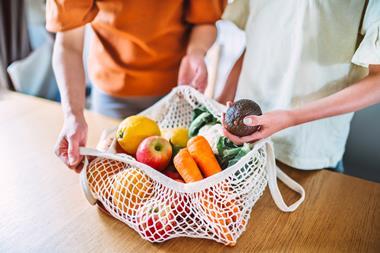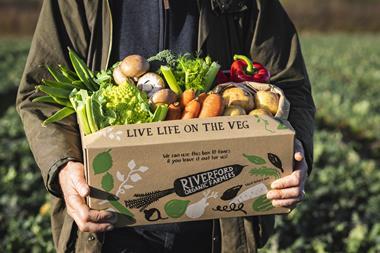If you like your snacks to combine the healthiness of fruit with the convenience of crisps, one Derbyshire-based company may be right up your street.
Urban Fresh Fruit focuses on providing a healthy alternative for those unable to curb their sweet-tooth cravings.
The genius of the product is its simplicity – the snacks are packets of dried fruit. The company was set up in 2006 by Andrew and Hayley Gait-Golding. Of course, dried fruit is nothing new, but the couple perfected a drying technique that avoided adding sugar or preservatives. In doing so they have moved away from more conventional methods such as covering the fruit in syrup and frying in oil.
They first realised the potential of dried fruits when they were travelling abroad as part of Andrew’s cricket team’s tour. “Everywhere I went there was chocolate and crisps, but I wanted something healthy,” says Hayley. “I packed fruit, but it would just get bruised.”
On their return to the UK, they produced 2,000kg of dried black cherries and strawberries for family and friends to try. “Everyone said they were really good, so we took a risk,” says Hayley. “We bought a tonne of fruit and dried it, sent it out and got an appointment with Waitrose, which turned out to be our first customer.”
It wasn’t long before Sainsbury’s, Tesco, Asda, the Co-op and a number of independent retailers followed suit. Over time, Urban Fresh Fruit has steadily built up its offer – today nine different fruits are sold in three bag sizes. Varieties range from strawberry and banana to the more eclectic papaya and white cherry.
Bestsellers are pineapple, black cherry and mango, but Hayley is keen to stress it’s still early days and the company continues to do sampling trials to see what people like best. Sourcing such a wide variety of exotic fruits is no easy job, but the company does its best to cut down on its carbon footprint. All fruit is dried before being transported to save space, and everything is shipped rather than imported by air.
Urban Fresh Fruit’s ethical standards are as high as its environmental ones. Much of its produce is sourced from a remote area of Ecuador, near poor and isolated villages called Ilusiones. The company’s demand for fruit pickers has created work for 70 people, the majority women. As almost half are single mothers, the company is also in the process of helping to pay for a nursery to care for their children while they’re working.
The company’s compassion may have far-reaching consequences, but its target market is firmly rooted in the UK. Hayley says they are keen to be placed with crisps, chocolates and sandwiches in food-to-go areas, and not just in the home-baking aisles.
“It’s exciting to think our fruits have performed well enough to earn a place next to other snacks such as smoothies, chocolate bars and crisps,” she says. “We want to blow a few cobwebs away and take dried fruit places it has never been before.”
The genius of the product is its simplicity – the snacks are packets of dried fruit. The company was set up in 2006 by Andrew and Hayley Gait-Golding. Of course, dried fruit is nothing new, but the couple perfected a drying technique that avoided adding sugar or preservatives. In doing so they have moved away from more conventional methods such as covering the fruit in syrup and frying in oil.
They first realised the potential of dried fruits when they were travelling abroad as part of Andrew’s cricket team’s tour. “Everywhere I went there was chocolate and crisps, but I wanted something healthy,” says Hayley. “I packed fruit, but it would just get bruised.”
On their return to the UK, they produced 2,000kg of dried black cherries and strawberries for family and friends to try. “Everyone said they were really good, so we took a risk,” says Hayley. “We bought a tonne of fruit and dried it, sent it out and got an appointment with Waitrose, which turned out to be our first customer.”
It wasn’t long before Sainsbury’s, Tesco, Asda, the Co-op and a number of independent retailers followed suit. Over time, Urban Fresh Fruit has steadily built up its offer – today nine different fruits are sold in three bag sizes. Varieties range from strawberry and banana to the more eclectic papaya and white cherry.
Bestsellers are pineapple, black cherry and mango, but Hayley is keen to stress it’s still early days and the company continues to do sampling trials to see what people like best. Sourcing such a wide variety of exotic fruits is no easy job, but the company does its best to cut down on its carbon footprint. All fruit is dried before being transported to save space, and everything is shipped rather than imported by air.
Urban Fresh Fruit’s ethical standards are as high as its environmental ones. Much of its produce is sourced from a remote area of Ecuador, near poor and isolated villages called Ilusiones. The company’s demand for fruit pickers has created work for 70 people, the majority women. As almost half are single mothers, the company is also in the process of helping to pay for a nursery to care for their children while they’re working.
The company’s compassion may have far-reaching consequences, but its target market is firmly rooted in the UK. Hayley says they are keen to be placed with crisps, chocolates and sandwiches in food-to-go areas, and not just in the home-baking aisles.
“It’s exciting to think our fruits have performed well enough to earn a place next to other snacks such as smoothies, chocolate bars and crisps,” she says. “We want to blow a few cobwebs away and take dried fruit places it has never been before.”
















No comments yet